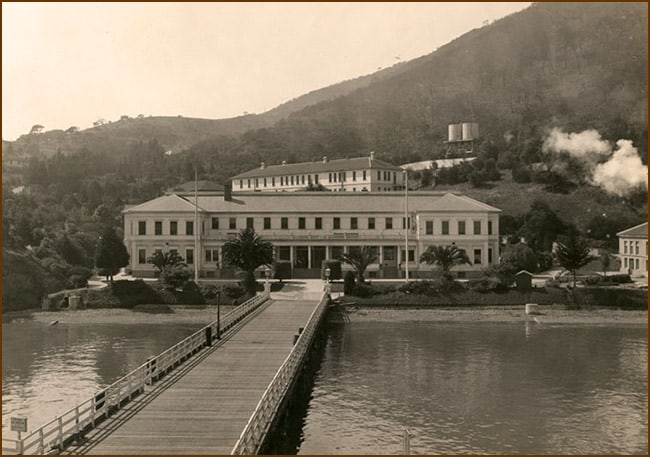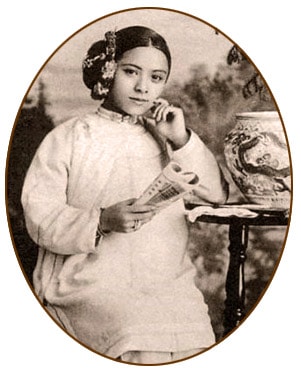
Standing just over four feet tall, she was nicknamed “Tiny.” But when it came to character, compassion, and her dedication to civil rights and women’s rights, there was nothing small about Tye Leung Schulze.
She was born in San Francisco at a time of intense xenophobia against Chinese immigrants and Chinese-Americans following passage of the 1882 Chinese Exclusion Act. Severely restricting Chinese immigration to the United States, it was the first time a single ethnic group was targeted for exclusion for immigration to America.
Her parents struggled to make ends meet, her father earning $20 a month as a cobbler, her mother helping out at a nearby boarding house. Home to eight children (Tye being the youngest daughter), two parents and an elderly aunt and uncle, their two-room apartment in Chinatown was bursting at the seams.
Segregated schools
Leung experienced racism first-hand at an early age when local laws forced Chinese-American children into separate schools. But Tye was sent to a local Presbyterian Mission Home run by teacher and activist Donaldina Cameron, where she learned English. Cameron and her work in Chinatown would have a profound influence on Leung’s life.
When she was nine, her mother sent her to another family’s household to work as a “domestic servant.” What she didn’t know was that she had, in fact, been sold. Her uncle, realizing what had happened, contacted Leung’s teachers at the mission school, who facilitated her return home. She was one of the lucky ones.
Gold Rush brothels
By the early 1890s, San Francisco’s Chinatown had become a “bachelor society.” The first waves of Chinese immigrants were laborers hoping to cash in on the California Gold Rush — working the mines, toiling in the fields and building the railroads. Brothels, in part because of the Chinese Exclusion Act, did a booming business. And girls like Leung, sold into “domestic servitude,” often wound up working as prostitutes or being trafficked once they came of age.
Tye Leung Schulze turned to the familiar Mission Home again as a young teenager after her parents had arranged a marriage between an older sister and a man from Montana. But when the sister escaped by running away with her boyfriend, Plan B was to simply substitute Leung for her older sister. Rather than submit, she fled to the Presbyterian Mission. For her part, Cameron considered Leung no different than an escaping slave, and provided her a refuge where she could live and continue her education.
Freeing sex slaves
Before long, Leung began working as a translator and interpreter as the Mission worked tirelessly to free Chinese women and girls from the sex trade. Over the course of her work, Cameron and her mission rescued some 3,000 Chinese women and girls from the sex trade in San Francisco’s Chinatown.

Perhaps as a result of her work with Cameron, Leung decided to take the civil service exam and, in 1910, became the first Chinese-American woman employed by the federal government. Assigned to the new Angel Island Immigration Station, she worked in the women’s quarters as a translator, providing a touch of home and some degree of comfort during embarrassing physical exams and lengthy interrogations, while keeping a special eye out for women being trafficked. Angel Island was one way to investigate Chinese immigrants who had been denied entry by the Chinese Exclusion Act of 1882, which had been extended indefinitely, detaining them for anywhere from a few weeks to as long as two years.
Higher levels of scrutiny
Thanks to the Page Act of 1875, forbidding the entry of “immoral Chinese women,” or prostitutes, Chinese women faced higher levels of scrutiny. Every Chinese woman on Angel Island was suspect until she could prove her virtue, including providing details about her sex life. At that time, women unaccompanied by husbands or fathers were unlikely to find work, meaning they would either become a public charge or be trafficked as part of Chinatown’s sex trade.

First Chinese-American woman to vote
In 1912, Leung Schulze made history when she became the first Chinese-American woman to vote in America’s presidential election — a bitter contest between Woodrow Wilson, Teddy Roosevelt and William Howard Taft before Wilson prevailed. She voted along with other California women given the franchise by the state in 1911. Interviewed after casting her vote, Leung described her experience:
“My first vote? Oh, yes, I thought long over that. I studied; I read about all your men who wished to be president. I learned about the new laws. I wanted to KNOW what was right, not to act blindly…I think it right we should all try to learn, not vote blindly, since we have been given this right to say which man we think is the greatest…I think too that we women are more careful than the men. We want to do our whole duty more. I do not think it is just the newness that makes us like that. It is conscience.”
Tye Leung Schulze was 25 when she received nationwide news coverage as the first Chinese-American woman to vote. While the local San Francisco Call reported, “Celestial Maid Cast HerVote,” New York’s The Brooklyn Citizen managed to be condescending, racist and sexist all in one fell swoop while misspelling Tye’s name: “Ah Tie Lieung is the first Chinese woman to vote for a Presidential candidate. Ah Tie is a very human little girl, one of the cleverest and prettiest children of her race that have ever grown up in America.” And while the San Francisco Examiner hailed her vote as “… the latest achievement in the great American work of amalgamating and lifting up all the races,” Leung soon realized that was anything but true.

Miscegenation laws
While working at Angel Island, she had met and fallen in love with Charles Schulze, an Immigration Service Inspector. And despite the Examiner’s lofty words, California was one of 15 states with interracial miscegenation laws prohibiting Leung and Schulze from marrying. So in 1913, Tye Leung broke another barrier when she and Schulze, despite the disapproval of both families, eloped to the state of Washington. Shortly after their return to California, facing deeply-held prejudice against interracial marriage, they both lost their jobs with the Immigration Service. It was only with considerable difficulty both eventually found other work, living as man and wife on the outskirts of Chinatown with their four children until Charles’ death in 1934.
His death left Leung Schulze to raise their children alone. To support her family, she worked as a bookkeeper with the San Francisco Chinese Hospital and, later, as a night-shift switchboard operator with Pacific Telephone’s Chinatown exchange. Considering the scarcity of work for Chinese-American women at the time, being one of 22 women working three shifts around the clock handling about 17,000 calls a day, it was considered a plum job.
Tireless worker
With her knowledge of Chinese dialects and her skill as a translator, Leung Schulze became a respected fixture in the community, interpreting for GI brides, recently-arrived immigrants, and in court cases as she continued in the fight to free women from Chinatown’s sex-trafficking. Known for her sympathy and compassion, the courts trusted her as an excellent interpreter. Police departments valued her honesty and efficiency. And, continuing to work with the Presbyterian Mission, she was part of almost every rescue party that often found and seized sex slaves worth $3,000, following up each rescue with strong evidence in courts to convict the traffickers.
A champion of human rights and civil rights, Tye Leung Schulze broke boundaries. As someone of whom little was expected, she saw social injustice and did something about it. She died at the age of 84 in San Francisco in 1972. Leung Schulze was designated a 1987 Women’s History Month Honoree by the National Women’s History Project, and her story is now featured in a series of documentary shorts produced by Unladylike Productions, LLC, 2020.

